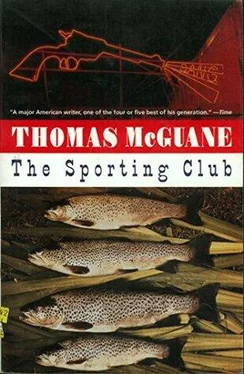It would be hard to say how long after that, he and Quinn met in the D-Day Bar and Grill, a mock bunker filled with war materials, bombs painted to look like happy fishes, land mines, howitzers, portable field toilets. Stanton was still depressed about the interrogations, Quinn amused; amused, that is, until he got an idea of Stanton’s ungodly depression. Stanton said that they were right, he deserved the worst. He had gotten some very convincing anonymous calls, one person calling him the “lowest form of human refuse.” “And what is that?” Stanton had asked, his humor intact. He confessed they were getting to him. And Quinn could see he was in distress. It assumed the familiar atrabilious humor at the start (“Fuck the Magna Carta in the ass”). By the time they left the bar and headed for the D.A.C., Stanton’s face had become a stone mask of thwarted rebellion. Quinn babbled at him and to him, from the heart and as best he could. They sat in the balcony over the pool, looking down at the empty green rectangle with its white water-polo backboards and undulant racing lanes. They swam and did cannonballs off the low board for which they were already too old. They went into the gym and Quinn got a basketball, dribbled preoccupied and did halfhearted lay-ups as Stanton bounced somberly on a nearby trampoline. They strolled naked except for medicated paper slippers and talked about the fathers-and-sons days they had attended, diving for silver dollars in the pool and afterward listening to Eddie Peabody in the auditorium. It was no use. Stanton’s face remained pinched, a congestion of nerve ends. He challenged Quinn to a game of billiards and no more than got started before he slapped his cue stick across the table with a small cry and suggested dinner. Quinn watched him try to eat his way out of his depression. Consuming mechanically tournedos de boeuf and a thirty-dollar bottle of Château Margaux, he scribbled his number on the check and jumped up. Quinn went with him to the lobby where he bought a fistful of cigars and stuck them in his vest pocket. Out front he pressed a bill pointlessly into the doorman’s hand and waited for his car to be brought. It was a winter night, black and cold to silence. When the car came, Stanton pressed another bill. “The thing is,” he said to Quinn and stopped, something racing behind his eyes. He went around the driver’s door. Quinn followed and said that it had been unfair to drag him around from one build-up to another and drive off. Stanton replied combatively from inside the car, “Well, that may be what I’ll do, old pal…” and trailed off. He rested the bridge of his nose on the steering wheel and said, “It’s nothing. I’m boxed in, is all. Nothing.” He sat up and drove away. The next time Quinn saw him was a few weeks ago, standing in his linen shorts, sweat runneling off him: the heroic manner.
Interim reports, less somber than expected, suggested furious play, operating out of his boat down South. Quinn had a letter describing tarpon fishing at Big Pine Key, Florida. Then a newspaper article from Key West: Stanton and friends had stormed the naval installation there; on capture, they had tried to pass themselves off as Castro partisans. For a while, cards and letters: gambling at Grand Bahama, pig shooting at Abaco, tarpon again at Andros, whoring at Nassau, partying at Eleuthera. On Grand Turk Island he was persuaded to put up twenty thousand dollars to investigate the possibility of celestial navigation in sea turtles. News of him began to abate in the Antilles proper. He was charged with espionage in Haiti quite arbitrarily and he was convinced by the Tonton Macoute that it would be clever to fly out and leave the boat. He bought another from an English yacht broker in Antigua and wrote Quinn to tell him he was going to Puerto Rico because of his love for beisbol. Quinn didn’t hear from him again. Throughout these letters, though he had little to go on, Quinn got an impression of metallic insensibility that approached stupefaction, like letters from someone in shell shock. The rest was from Janey on; and she, it seemed, wasn’t talking. “Are you?”
“Nope.”
“Why not?”
“Because there is no place to start. It doesn’t make a story.” A single strangely shaped shadow revealed the declivity of her cheek and any motion at all made her eyes go from reflecting to bottomless. No wonder she had Stanton under such crazy control as Quinn was now sure she had, dancing like a circus horse, a little out of hand perhaps, but out there on the lead under unreckonable command. Quinn liked this thought: Stanton a little dappled stallion waltzing on a barrel head, jumping through pastel flames; behind, the gallery in regular ascending semicircles of vacuous faces; Stanton’s hoofs muffled in the sawdust as he trots steadily round Janey in silk top hat and tails, her whip curling toward his dappled buttocks like a silk thread. Then, after the last hoop, Stanton fetches up under the big top; there is mechanical applause like seawaves. A tiny car drives up and skids to a stop. Enthusiastic applause as a family of midgets bails out with luggage. The pony begins to go sour. He whinnies aggressively. The midgets stop in trepidation. The booing begins like the groaning of a tree about to fall and rises as the pony rushes among the midgets, striking out with varnished crescent hoofs, the booing rising as the midgets begin to take a beating; then the inscrutable crowd comes out of the bleachers and smothers the pony in sharp downward blows like the branches of a collapsing tree. As it came to Quinn’s mind, he wondered if it was accurate.
Janey said: “One night, in Puerto Rico, Vernor heard a woman crying on the balcony outside his hotel. He went out and saw her leaning against the wall covering her face up with her hands. She was still crying. Vernor asked what happened and she said she had been attacked by a man. Vernor asked her what he looked like and she took her hands down from her face. Vernor asked her what he looked like again and she stared at him just a minute and said, ‘You.’ ” The woman, Janey said, was her Aunt Judy. Vernor was horrified and fascinated, he fell in love. But she only went out with him and let him stay with her betweentimes: there were others. “I had to console the poor lovesick baby and, oh, me, he was starry-eyed! He offered her the world and everything he had. Now, then, one day he came over in the morning. I think it was on a hunch. Judy was sleeping in the bedroom with a dealer from the El Convento. And Vernor smoked and fussed and tried to talk to me. I can tell you it was tense, boy. I talked my head off. Vernor was puffing his cigarette and squinting at the bedroom door until Judy came out in a peignoir still beautiful but very rundown looking and in a bad mood. Vernor tried too hard to be pleasant and told her she looked mussed up or something, though maybe it was only the unfortunate lighting. Judy said, ‘I just woke up. Get it? I just woke up.’ He began yelling that someone was there. The dealer walked out of the bedroom, fully dressed and said, ‘A for excellent.’ He had a pistol in his hand and he wasn’t waving it around or anything. He just had it. He walked right past Vernor and went over to the mirror and tucked the pistol under his chin and smoothed his hair down with both hands. Then he put the pistol in the top of his pants and squeezed the knot of his tie between his thumbs and put the pistol in his pocket. He asked Vernor how he looked and Vernor said he looked as sharp as a tack. And then the dealer asked how he liked the tie and I thought somebody would get killed but Vernor said that the tie was of the very finest.” Later, Stanton befriended the dealer and took him deep-sea fishing and by some slip or concatenation of circumstances left the dealer in a yellow rubber raft a hundred miles off the Mayaguana Bank. When the police informed Stanton that though the dealer would not let them bring him to justice, they thought he ought to know the man was in the hospital with third degree burns from the sun. “Next time,” Stanton said, “he won’t leave his Coppertone on his beach blanket.” Judy used the police without reserve; she kept a small, gray one at her door with instructions to shoot or arrest Stanton on sight. “He got so desperate he settled for me,” said Janey. “And I couldn’t pass him up.”
Читать дальше












